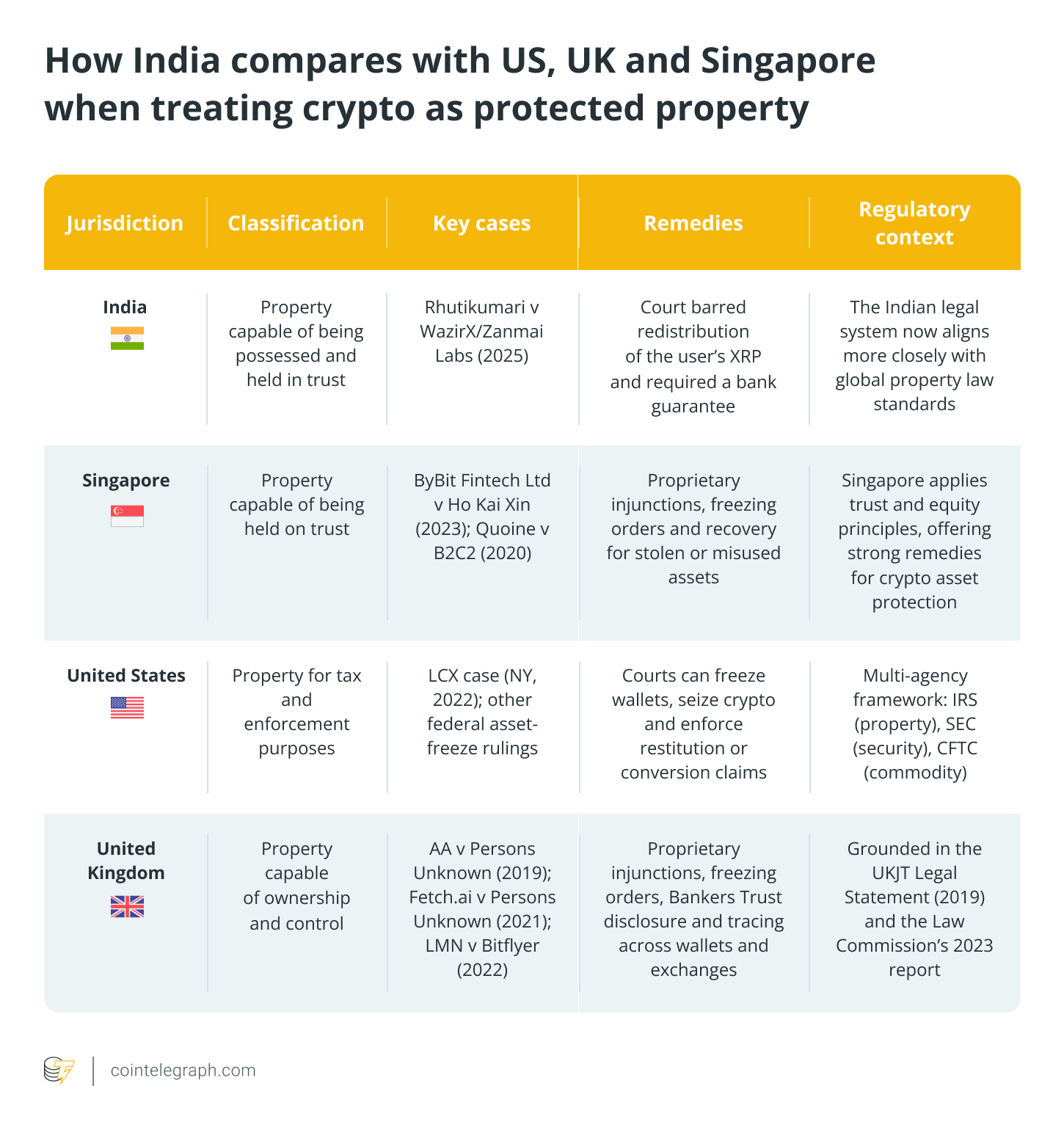
XRP Achieves Legal Status as Property in India: Implications of the Court's Decision
A recent ruling by the Madras High Court establishes XRP as legal property in India, impacting the rights of cryptocurrency holders.
XRP Achieves Legal Status as Property in India: Implications of the Court’s Decision
Background on the Case
The legal journey began when Rhutikumari, a holder of XRP, filed a petition against WazirX after the platform froze her account containing 3,532.30 XRP, valued at approximately $9,400. This action followed a hacking incident in July 2024 that resulted in the loss of around $235 million in various assets.
To compensate for the losses, WazirX proposed a controversial plan that aimed to distribute the financial burden among all user accounts. However, Rhutikumari opposed this plan, arguing that it violated her ownership rights.
In defense, WazirX claimed that the matter fell under a Singapore High Court-approved restructuring plan for user compensations. Furthermore, they argued that they didn’t directly own user wallets and deemed the Madras High Court to lack jurisdiction due to arbitration occurring in Singapore. They also noted that trading and withdrawals were temporarily halted during this restructuring process.
Consequently, the Madras High Court had to decide not only on Rhutikumari’s account but also on the classification of cryptocurrencies like XRP under Indian law.
Legal Recognition of Cryptocurrencies
In a pivotal ruling, the Madras High Court recognized digital assets, including cryptocurrencies like XRP, as property under Indian law.
Justice N. Anand Venkatesh stated that digital assets, being intangible, could be possessed and held in trust, going beyond mere speculative instruments. This decision was backed by referencing Section 2(47A) of the Income Tax Act and drawing from both Indian law precedents and international cases, including one from New Zealand.
While WazirX defended its actions based on a Singapore-backed restructuring scheme, the court maintained jurisdiction due to Rhutikumari’s fund transfers from an Indian bank and access to the WazirX platform from within India.
As part of the interim relief, the court forbade Zanmai Labs, operating WazirX, from reallocating Rhutikumari’s XRP and ordered that the exchange secure a bank guarantee of about $11,500 until the issue is resolved. This landmark ruling effectively establishes cryptocurrency ownership as a legally secured right in India.
Significance of the Court’s Ruling
This landmark judgment signifies a turning point for the Indian cryptocurrency landscape, as it offers much-needed legal clarity regarding digital asset ownership. For the first time, a high court has officially classified XRP as property, thereby granting investors distinct ownership rights.
The interim order from the Madras High Court protects users by prohibiting WazirX from reallocating or liquidating user assets as a way to mitigate losses stemming from hacks. This decision sets a precedent for how courts may regard crypto assets—considering them as owned property rather than unsecured claims against an exchange.
Experts anticipate that this ruling will enhance investor confidence in XRP and encourage clearer regulations regarding digital asset holdings in India.
Aligning with Global Standards
The recognition of cryptocurrencies as property aligns India with jurisdictions like the US, UK, and Singapore that also classify such assets within similar legal frameworks. The IRS in the U.S. views virtual currencies as property for tax purposes, allowing assets to be subject to legal recovery strategies after theft or fraud.
English courts also recognize crypto assets as property, allowing for various legal remedies in cases of disputes.
In Singapore, the High Court recently ruled that crypto assets could be held on trust, strengthening the legal standing of digital currencies.
 XRP
XRP
Implications for Investors and Exchanges
With XRP recognized as property, local demand may increase, positively affecting investor confidence. The ruling is anticipated to encourage exchanges in India to revise their terms of service, adjusting custody arrangements to comply with this new classification.
Understanding their legal rights has become critical for investors as they now enjoy stronger ownership recognition over their digital assets held by exchanges, positioning India closer to regulatory frameworks in the US, UK, and Singapore.
Limitations of the Ruling
Despite being a significant advancement, the Madras High Court’s ruling has limitations:
- Specificity: The ruling is an interim order concerning one holder’s XRP and may not broadly apply to all cryptocurrencies or exchanges.
- Classification Clarity: The court specified that XRP is not a “currency” but rather an intangible property, creating uncertainty for other digital assets.
- Enforcement Challenges: Effective enforcement may rely heavily on exchanges’ practices and their transparency.
- Regulatory Landscape: India continues to lack a thorough regulatory framework for cryptocurrencies, meaning future legislative changes could affect the ruling.
- Cross-Border Complications: Transactions that cross jurisdictions may face complexities, as protections might not hold outside India’s borders.
This article does not offer financial advice. All trading entails risk, and readers should perform their due diligence before making investments.



